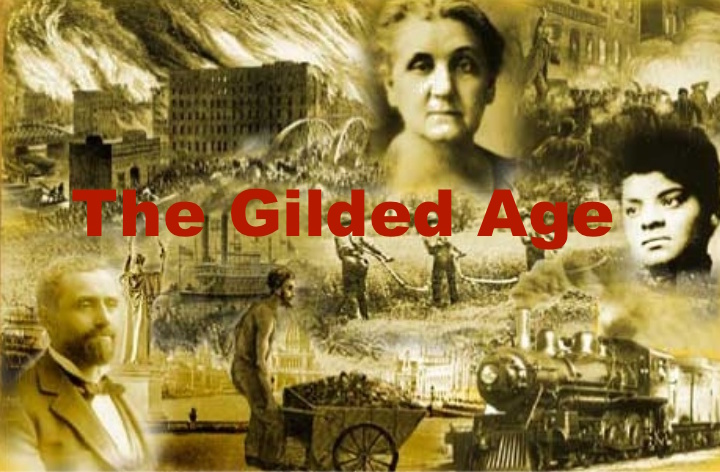UNIT 2:
THE GILDED AGE
1865 - 1900
The Gilded AgeIn Unit 2, The Gilded Age, you will learn about the Gilded Age. The Gilded Age covers four major topics: Westward Expansion, industrialization, immigration, and urbanization in America.
Westward expansion brought economic change and conflict. Mining, ranching, and railroads changed the economy of the West. Offers of free land encouraged farmers to settle in the Great Plains. At the same time, more conflicts broke out between white settlers and Native Americans. Industrialization led to new sources of power and to advances in transportation and communications. New forms of business organization also emerged, and more workers joined labor unions. In the late 1800s a new wave of immigration brought many people to America. The journey was often difficult, as was adjusting to a new life upon arrival. At the same time many African Americans were migrating out of the South and into the North and West in search of a better life and more opportunities. This new wave of immigrants and mass migration of African Americans led to the growth of American cities. New technology and ideas helped cities change and adapt to this rapid growth. Though problems still remained, people worked hard to improve the quality of life in American cities. Table of ContentsClick on the titles below to go to that lesson module.
Introduction
Topic 1: Westward ExpansionLesson 2: Miners, Ranchers, and Railroads
Lesson 3: Wars for the West
Lesson 4: Farming and Populism
Topic 2: IndustrializationTopic 3: ImmigrationTopic 4: Urbanization |
TOOL BOXThe Toolbox contains all the definitions of bolded words in the order in which they appear.
The Gilded Age: a period of great change in U.S. history spanning from roughly 1865 until 1900 including American Westward Expansion, industrialization, immigration, and urbanization where there were many changes in lifestyles, developments in technology, and a good amount of political corruption
Westward Expansion: when people moved to the new territories in the American West and established homes, farms, businesses and towns there industrialization: when the people of the nation leave farming as their major way of making money and begin producing things in industries as their major way of making money immigration: when a person comes to a nation to live there permanently urbanization: the process by which towns and cities are formed and become larger as more and more people begin living and working in central areas |

